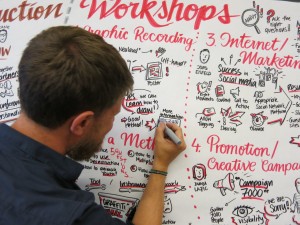“Attitude is a little thing that makes a big difference” Sir Winston Churchill
Churchill may have been referring more broadly about ‘attitude’; here I’m going to write about it quite specifically as it relates to spoken communications. I am sure, however, that attitude does make a big difference.
The attitude, or in Neuro Linguistic Programming (NLP) terms, the ‘state’ you adopt when you’re about to deliver a pitch, a presentation or a speech, plays a crucial part in how you come across to your audience. It can set the tone well – or badly – for the duration of your talk.
Having had a fascination for ‘states’ or ‘attitudes’ of mind for more than 25 years, I decided almost ten years ago to do my NLP Business Practitioner training.
I wanted a suite of tools and techniques that would benefit my clients when I coached them, which they could then use themselves, such as in preparing for a pitch presentation or any other form of public speaking.
One of the more effective techniques to get yourself into the right state of mind and accomplish your goals is something called Process Visualisation, or Mental Simulation. This is not to be confused with the sort of fantasy visualisation (outcome-based) which seems to be so popular in the self-help genre.
In 1999, Californian psychologists, Lien Pham and Shelley E. Taylor published a paper on a piece of research* in which they described their experiment thus:
“For 5 to 7 days prior to a midterm examination, college freshmen (a) mentally simulated either the process for doing well on the exam (good study habits) or (b) simulated a desired outcome (getting a good grade) or (c) both. A self-monitoring control condition (d) was included. (Comparative) results indicated that Process Simulation enhanced studying and improved grades; the latter effect was mediated by enhanced planning and reduced anxiety.”
Process Simulation enhances the ability to visualise the outcomes, improving the pursuit of the goal. The technique is a simple one to master and can be used in a variety of different situations; athletes have been using this form of visualisation for decades. But how does it apply to presenters?
Well, let’s start with some of the goals we might have in a public speaking situation:
- reducing anxiety and managing nerves
- conveying credibility and gravitas
- seeming confident and knowledgeable
- handling tricky questions and concerns well.
Now assume you’re using a slide deck that you have been involved in preparing. You might visualise or ‘mentally simulate’ yourself:
- speaking fluently and confidently, supported by your slides
- arriving ahead of time to ensure A/V equipment is compatible and working
- coping effectively with any technical or logistical issues that arise
- presenting to an audience who may be devoid of expression, texting on their mobiles, talking to each other or, hopefully, nodding and smiling in agreement
- handling difficult questions and any concerns.
The key to Process Simulation is to link the thought with an action; you will notice that the points above are very action-orientated.
These actions can then be rehearsed prior to an important presentation.
Earlier this month, I used the Mental Simulation approach before I trained several groups of ‘Super Users’ at Great Ormond Street Hospital, prior to the launch of a new clinical system.
A key outcome I had in mind was to successfully train a select group so that they had the knowledge to train others. Some of the elements that worked well for me personally on this project were:
- brief, frequent project meetings for 10 days leading up to the start of the training that gave me a high degree of comfort with the subject matter
- owning the content on the slide deck, through familiarising myself and editing it where necessary
- rehearsing alone (recording myself on my mobile) and in front of two colleagues
- mentally simulating my delivery a further two times
- making sure the A/V equipment in all rooms we trained in was checked ahead of time.
I’m not saying there were no technical glitches or challenging questions, but being prepared well by using such a process is a significant part of what distinguishes an average presentation from a outstanding one (another being how brilliant the content is!).
Being so well-prepared created a positive attitude in me, so that I was (and came across as) confident and competent in those training sessions from day one; this was transmitted quite clearly to my audience.
Process Visualisation has you plan and take the necessary steps to ensure that you have prepared well, which in turn gives you greater confidence and reduces your anxiety, putting you in the right state prior to your presentation.
Perhaps that’s not as exciting or thrilling as fantasising about a standing ovation, but it’s far more grounded in reality, therefore achievable and so considerably more effective.
Thinking about the next time you are asked to present at an important meeting or deliver a paper at a conference, what might you be able to prepare for in advance to get you into the optimum mental state? Could you anticipate some potential difficult questions or objections that might be raised, and prepare your answers in advance?
Could you mentally simulate being self-assured with a mixed audience of engaged and disinterested people?
You will most likely have your own personal goals that you have visualized. However, a good result could be that you are well prepared but do not seem over-rehearsed, insincere or stilted. Or, as Sir Winston Churchill said:
“I’m just preparing my impromptu remarks”.
By Lynda Russell-Whitaker
gpb-60th-journal-summer-2016-article-2-lrw-mental-simulator



